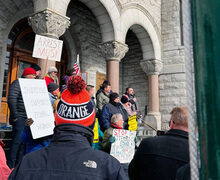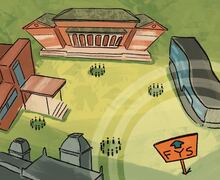Project Mend calls for justice reform, celebrates 3rd issue
Charlie Hynes | Staff Photographer
Community members honored those impacted by mass incarceration, celebrating Project Mend’s third issue. Speakers discussed support for formerly incarcerated individuals, highlighting resilience and creativity.
Get the latest Syracuse news delivered right to your inbox.
Subscribe to our newsletter here.
Community members gathered Saturday afternoon to honor the lives and literary works of those impacted by mass incarceration and the United States justice system. Multiple speakers shared their personal experiences while celebrating the release of Project Mend’s third issue.
Speakers discussed the need for formerly incarcerated people and those impacted by incarceration to have systems of support, as well as strong community and continued advocacy.
The gathering came under difficult times for the group’s efforts, as a second Donald Trump presidency is expected to bring stricter sentences and the potential reinstatement of the death penalty, while early executive orders have called for the mass arrest of undocumented immigrants.
Troy White, Mend’s senior editor, said the magazine aims to confront the truths of the criminal justice system while remaining grounded in principles of empathy, collaboration and a central need to create change.
“Incarceration … affects more than just those physically behind bars. It affects families, communities, and society as a whole,” White said.

Charlie Hynes | Staff Photographer
Project Mend’s third issue was celebrated with reflections on the impact of incarceration on families and communities. Speakers shared personal stories and called for continued advocacy and empowerment.
Project Mend is an initiative focusing on writing and publishing as a way to help formerly incarcerated people reimagine themselves through storytelling, Patrick Berry, associate professor of writing and rhetoric at Syracuse University, said. The group creates an annual literary magazine seeking to help its writers share their experiences and develop new skills, such as storytelling and self-expression.
Richard Rivera, deputy assistant to the Executive Director of Special Initiatives at the Center for Community Alternatives, served 39 years in federal prison and shared his article titled, “Crazy: The Pursuit of Men’s Health Behind Bars.”
Through his experiences, River discussed incarcerated men’s diverse perspectives on health in prison, highlighting his own pursuit of well-being through physical exercise, nutrition and faith. He emphasized the hyper-masculine, competitive dynamics of gym groups and the social bonds formed while behind bars.
“Some incarcerated individuals prompted physical exercise, others nutrition and still there’s a gravitation to faith communities,” Rivera said. “Ultimately, health is about finding ways of surviving, sometimes seriously, sometimes irrationally.”

Charlie Hynes | Staff Photographer
Project Mend’s third issue was was shown in an issue that spotlighted the voices of those affected by mass incarceration. Speakers emphasized community support and creative expression.
Mary Carr, an editor of Project Mend, reflected on the importance of community building and spoke about the project’s impact. She said it was important to recognize the impact of groups like Mend in promoting social change, emphasizing the use of captivating poetry and art to tell unheard stories. Carr discussed her experience dealing with the incarceration of her grandson.
“(Events) like this need to happen to bring outside people in who don’t realize that there is something that we can do to help some of the people who went to jail,” Carr said.
Mend Editor Charlee Crosby read Sonny Cochran’s poem titled, “Juneteenth,” reflecting on the resistance, perseverance and empowerment within the Black community. The piece emphasized unity, political activism and the importance of honoring the sacrifices of historical figures like Malcolm X and Martin Luther King Jr.
Crosby called for an end to violence and crime in Black communities, urging youth to find alternative ways to thrive. He believes stigma is entrenched in society — a reality he hopes communities can overcome.
As national politics and Trump’s administration continue to affect local communities, Crosby expressed hope in the face of new obstacles. The president’s expansion of the prison system will likely result in extended sentences and increased policing, The Marshall Project reported. He also plans to reinstate family immigrant detention, which allows the incarceration of families with young children.
“Unfortunately, (mass incarceration) exists, but we are not gonna let that ruin us,” Crosby said. “We are going to keep moving forward as neighbors.”
Published on February 16, 2025 at 1:05 am





